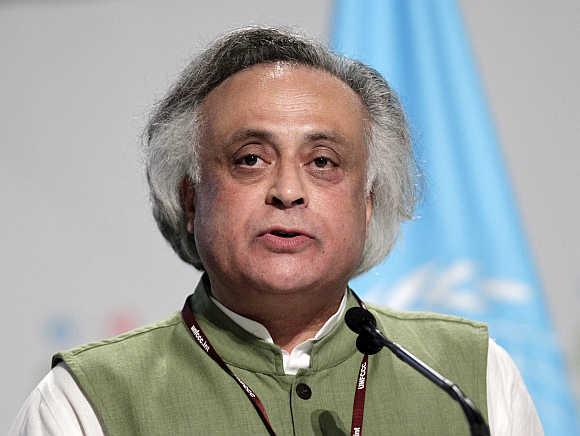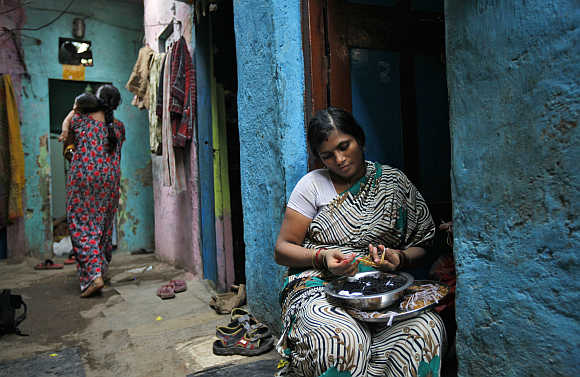Photographs: Henry Romero/Reuters Ravi Shanker Kapoor
In his valedictory address at the Microfinance India Summit in New Delhi on Wednesday, Rural Development Minister Jairam Ramesh may have called microfinance "a discredited model" in "a danger zone". But it is the politician-intellectual complex that will fix anything to suit its purpose - especially if the thing has evolved on its own and is effective.
Microfinance in Andhra Pradesh is one such victim of PIC's fixation with welfarism. The attacks on microfinance institutions by politicians, intellectuals and activists have wrought havoc on the sector and its stakeholders. It is a classic case of PIC functioning: while intellectuals and activists created a climate of opinion against MFIs by exaggerating their faults and downplaying their good points, politicians capitalised on the frenzy opinion-makers had worked up.
A sector that was booming - bringing succour to the poor and profits to entrepreneurs - was rendered sick. All in the name of helping the poor, ending farmer suicides, and so on. A few months ago, Business Standard reported that moneylenders are back in rural Andhra Pradesh, "grabbing the space vacated by microfinance institutions following the state government's decision to curb the micro-lending business of private players".
It went on to say "moneylenders, pawn brokers and middlemen are charging as high as 225 per cent interest rate per annum".
...
Bad old moneylenders are back with a vengeance
Image: Villagers take a nap in Jagatsingpur district in Orissa.Photographs: Stringer/Reuters
Another news report from Guntur said a poor couple sold their eight-month-old son to clear heavy debts. Evidently, the state government has no problem with moneylenders. At a Nabard (National Bank for Agriculture and Rural Development) function in Hyderabad on July 13, D Srinivasulu, principal secretary (industry and textiles, Government of Andhra Pradesh), said: "There is no point in replacing moneylenders who ensure quick delivery of credit in rural areas. What we should do is to bring competition (so that they reduce rates)."
If there is "no point" in checking those who "ensure quick delivery of credit", why were MFIs targeted? After all, MFIs were also doing just that. The rate of interest that they were charging was in the 20 to 40 per cent band, lower than what the poor people are forced to pay in their absence. Not that microfinance was without its problems; many MFIs ignored the principles of prudence, lent aggressively, and even overlooked the prospects of repayment.
Many poor individuals were able to borrow from as many as five lenders, but could not pay back. MFIs adopted strong-arm tactics, with deplorable consequences; even cases of suicide were reported. The problems associated with the sub-prime crisis of microfinance were magnified a million times and the good effects downplayed by activists, non-governmental organisations, politicians and bleeding-heart media analysts.
...
Bad old moneylenders are back with a vengeance
Image: Loan borrowers show pass books given to them by a microfinance company at Ibrahimpatnam near Hyderabad.Photographs: Krishnendu Halder/Reuters
The result was the draconian Andhra Pradesh Microfinance Institutions Act, 2010, which practically killed a system that was still evolving. And, the denouement? Bad old moneylenders are back with a vengeance. The promise was a better deal to the po#8744 the result is depressing. From utopia to dystopia, there is only one step. A couple of perverse axioms of public discourse has taken a heavy toll. First, prosperity is a zero-sum game in which a set of people can benefit only at the expense of another set.
The theorem that follows is that if some MFI entrepreneurs are making money, there must be people who are being "exploited". Aren't we taught that capitalists exploit the poor? The theorem, and the theory, goaded the jholawallahs to search for the existence of the exploited. The minor failings of microfinance, which were vastly amplified in the media and contemporary folklore, provided them the empirical evidence to prove the veracity of their assertions. So, MFIs are bad, evil and exploitative. QED.
Another axiom related to the very nature of human beings and society: men and women, particularly the poor, are incapable of working out a system, or letting it evolve, for public good or their own good; there is no such thing as an "invisible hand" that brings about a functional system; only interference by state organs can do that.
...
Bad old moneylenders are back with a vengeance
Image: An employee checks a Rs 500 note at a bank's microfinance division in Mumbai.Photographs: Punit Paranjpe/Reuters
And, this interference is defined and developed by an enlightened group of people - not philosopher kings, but philosophers, or rather philosophies, in aid of kings - who know what is good for lesser mortals.
The enlightened take care of the people's moral health, social welfare and, of course, economic well-being.
What was happening in Andhra was intolerable, according to the enlightened. MFIs were doing brisk business and earning a lot of money. The initial public offering of SKS Microfinance, for instance, proved to be a big hit; it raised Rs 1,600 crore (Rs 16 billion). The stock traded in the region of Rs 1,400 two years ago (it is below Rs 100 at present, though).
Like the puritan who was opposed to bull-baiting, not because it gave pain but pleasure to the spectators, the enlightened are not as infuriated by the misery of the poor as by the riches of the industrious. PIC is at war with MFIs. The Microfinance Institutions (Development and Regulation) Bill, 2012, which empowers the Reserve Bank of India to regulate microfinance and waits Parliamentary approval, is being opposed by the Andhra government.
...
Bad old moneylenders are back with a vengeance
Image: A microfinance company customer strings beads into necklaces in Mumbai.Photographs: Danish Siddiqui/Reuters
A prominent union minister is also against the proposed legislation. This is despite the fact that RBI wants to regulate the sector quite firmly. It had appointed the Malegam Committee, which recommended, among other things, a 24 per cent cap on interest rates. MFI representatives are uncomfortable with the Malegam Committee.
Yet, the Andhra government is opposed to even RBI regulating microfinance. With PIC unwilling to relent, there is little hope for the poor in the state; they will continue to pay triple-digit interest rates.
The author is a freelance journalist







article